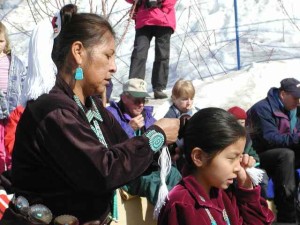The language we speak is a crucial part of our individual identities. Language can also be a social identifier – a way to tell who’s in and who’s out. This has been the case within the Native American Navajo Nation, where a candidate for president was disqualified last fall because he didn’t speak Navajo fluently. That candidate, Chris Deschene, had an impressive resume, having graduated from the Naval Academy, and subsequently earning a law degree and a master’s in engineering, before serving one term as a state representative. But he doesn’t speak Navajo fluently, having grown up away from the Navajo community. According to a story last year on NPR, “Deschene blamed his limitations on what he calls the tribe’s cultural destruction. Up until the 1960s, the U.S. federal government forced thousands of American Indians to attend boarding schools – among them, Deschene’s mother. While there, she was punished for speaking her native language. The U.S. government later relocated his parents to Southern California, where Chris was born.” This summer the Navajo Nation held a referendum on whether the president of the Navajo Nation should be required to speak fluent Navajo. The majority voted no. The story on NPR about the issue included laments from members of the Nation that the vote will erode the connection between the members of the tribe and their culture. It will also, they say, lead to less interest among the young in learning the language. They point out that many rituals and traditional aspects of the Navajo culture are tightly linked to the language.
The Navajo Nation has been in the news this summer also because of the action taken to tax junk food and soda. This too has a cultural side to it. The action was taken because of the very high rate of obesity and diabetes. The intent is to encourage members of the tribe to eat healthier food, especially more fruits and vegetables. One of the problems on the reservation has been the paucity of grocery stores; as a consequence, many people rely on convenience stores and fast food restaurants. To get to a good grocery store, tribal members need to drive off the reservation. According to Denisa Livingston, a spokeswoman for the grassroots group that pushed for the tax:
When people have to drive that many miles across the Navajo Nation in this food desert, it definitely is discouraging because healthy fresh fruits and vegetables and healthy foods will not last a very long time when you have to take it back hundreds of miles across the Navajo Nation.
The tribe plans to use the funds generated from the junk food tax on local farm initiatives. This is the socio-cultural aspect of the plan. Traditionally, Navajo people traditionally lived off the land. New initiatives such as the North Leupp Family Farms have helped about 30 families return to subsistence farming and eat healthier foods.
Moving the Navajo people – or any other community in the US – in the direction of embracing traditional ways of life, including native language use, family farming, and healthy food culture, is likely to be an uphill battle, given the ubiquitous presence of mainstream US media and advertising which point decidedly in opposing directions.

